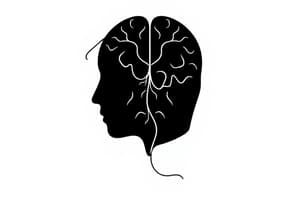Podcast
Questions and Answers
What occurs when remembering a list of related words leads to a false memory of another closely associated word?
What occurs when remembering a list of related words leads to a false memory of another closely associated word?
- False memory phenomenon (correct)
- Episodic memory lapse
- Explicit memory recall
- Sensory memory distortion
What type of intelligence focuses on the average commonalities across various intellectual abilities?
What type of intelligence focuses on the average commonalities across various intellectual abilities?
- Fluid intelligence
- Emotional intelligence
- Multiple intelligences
- General intelligence (correct)
What type of operant conditioning is represented by a child being spanked after disobeying a rule?
What type of operant conditioning is represented by a child being spanked after disobeying a rule?
- Positive punishment (correct)
- Positive reinforcement
- Negative punishment
- Negative reinforcement
Which term describes the process of learning to associate unrelated stimuli with involuntary behavior?
Which term describes the process of learning to associate unrelated stimuli with involuntary behavior?
What type of partial reinforcement schedule is used when a dog is rewarded for ringing a bell twice?
What type of partial reinforcement schedule is used when a dog is rewarded for ringing a bell twice?
What type of amnesia involves losing the ability to remember events prior to a specific event?
What type of amnesia involves losing the ability to remember events prior to a specific event?
Which of the following is a strategy to enhance memory by grouping items together?
Which of the following is a strategy to enhance memory by grouping items together?
Which of the following processes involves bringing back old memories but may alter them?
Which of the following processes involves bringing back old memories but may alter them?
What is it called when incorrect information influences the recall of past memories?
What is it called when incorrect information influences the recall of past memories?
Which term describes old information hindering the recall of newly learned information?
Which term describes old information hindering the recall of newly learned information?
Which of the following is NOT one of the seven sins of memory?
Which of the following is NOT one of the seven sins of memory?
What type of rehearsal involves making connections with prior knowledge to facilitate memory retention?
What type of rehearsal involves making connections with prior knowledge to facilitate memory retention?
Which mnemonic device involves creating a song to aid memory?
Which mnemonic device involves creating a song to aid memory?
Flashcards are hidden until you start studying
Study Notes
Memory Problems
- Anterograde Amnesia: Individuals can recall memories from before a specific event but are unable to form new memories after it.
- Retrograde Amnesia: Individuals can't remember events prior to a specific event but can form memories after it.
- Construction: The process of creating new memories.
- Reconstruction: The process of retrieving old memories.
- Suggestibility: Memories can be influenced by information from others.
- Misinformation: Exposure to incorrect information can lead to false memories or difficulty recalling accurate ones.
- Encoding Failure: Lack of attention during initial exposure can lead to incomplete memories.
- Interference: New information can disrupt the retrieval of previously learned information.
- Proactive Interference: Older information interferes with the recall of newly learned information.
- Retroactive Interference: Newly learned information interferes with the recall of older information.
- Seven Sins of Memory:
- Transience: Memory fading over time.
- Absentmindedness: Lapses in attention leading to forgetting.
- Blocking: Temporary inability to retrieve a specific piece of information.
- Suggestibility: Inaccurate memories influenced by others.
- Bias: Memories distorted by current beliefs or feelings.
- Misattribution: Attributing memories to the wrong source.
- Persistence: Unwanted memories that intrude on consciousness.
Memory Enhancement
- Chunking: Grouping related items together to improve memory.
- Rehearsal: Consciously repeating information to enhance memory.
- Elaboration Rehearsal: Connecting new information with existing knowledge for better recall.
- Mnemonic Devices: Strategies to organize information for encoding and storage.
- Acronyms: Abbreviations formed from the first letters of words.
- Acrostics: First or last letters of words that spell a word.
- Jingles: Memory aids set to music.
- Expressive Writing: Writing about experiences can improve short-term memory.
- Speaking Out Loud: Verbalising information can aid in memory retention.
- Retrieval Practice: Using strategies like flashcards, quizzes, or self-testing to enhance recall.
- Self-Reference Effect: Connecting information to personal experiences for better recall.
- Implicit Memories: Memories that are unconscious or non-declarative, often stored in the cerebrum.
- Rodger-McDermott Effect: Remembering a list of related words can create false memories of related but unpresented words.
- Recall: Retrieval of information without cues.
Other Key Points
- General Intelligence: Refers to the average commonalities across various intellectual abilities.
- Classical Conditioning: Learning to associate unrelated stimuli with involuntary behaviors.
- Positive Punishment: Applying an aversive consequence to decrease a behavior.
- Fixed Ratio Schedule: Reinforcement is delivered after a specific number of responses.
- Secondary Reinforcer: A stimulus that acquires reinforcing properties through association with a primary reinforcer.
Studying That Suits You
Use AI to generate personalized quizzes and flashcards to suit your learning preferences.




